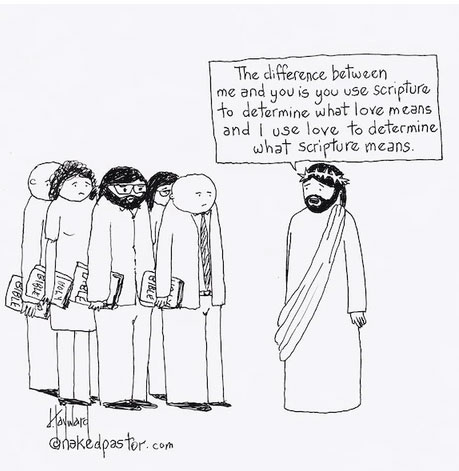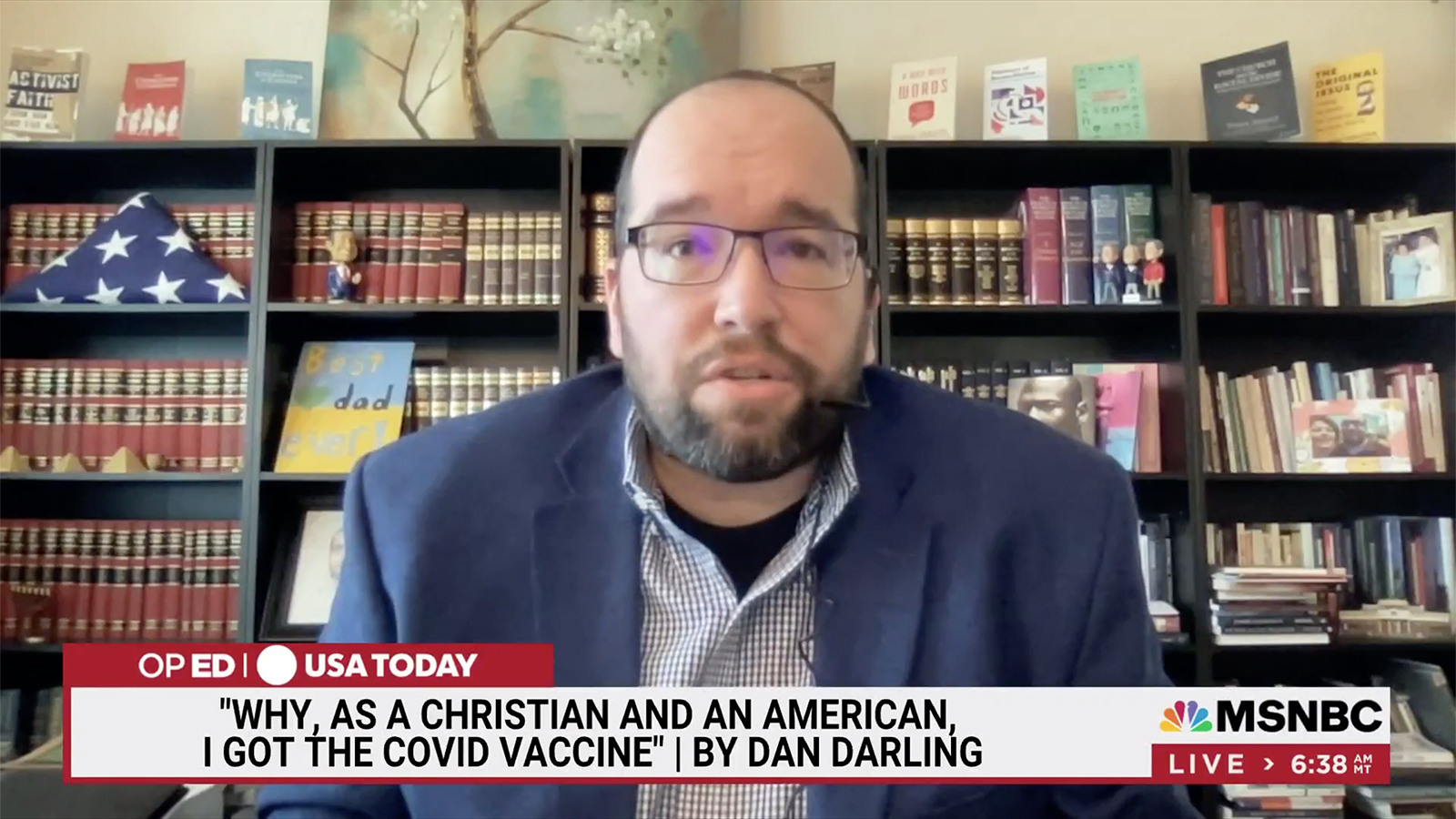If we asked people to vote on a divine character quality they most appreciate, God’s love would surely receive far more votes than His holiness. Christians tend to reflect our culture, and because our culture values love and devalues holiness, we do the same. We have taken one precious divine attribute, love, defined it as we please, then used our redefinition to neutralize other attributes of God’s that don’t appeal to us.
Consider, for example, this comic:

The artist explains,
Jesus says to a group of people holding their bibles, “The difference between me and you is you use scripture to determine what loves means and I use love to determine what scripture means.” This upsets some because to them Jesus IS the Bible, conflated and equated. And the Bible is love, conflated and equated. They commit the unavoidable hermeneutical method of reading into the text their understanding of what it means. We all do it. In fact, it can’t be helped! They may presume they’re doing letting the Bible speak for itself, but that’s impossible. We all have our own hermeneutic.
…We all bring to the text our own minds (open or closed) and our own hearts (hard or soft) and will read into the text our own predispositions. This is why we see the perplexing reality of terrorists and peace-activists inspired by the same Bible. So, it comes down to the personal internal work of self-awareness, humility, and a willingness to learn and grow. This almost always happens during deconstruction.
I agree that everyone brings assumptions and an interpretive grid to the text of Scripture. We all have a systematic theology—it’s just that often it’s full of holes and not biblically based. That’s why we must engage in smart study of God’s Word, seeking to understand what He is communicating throughout the entirety of the Bible rather than trusting our own “personal internal work.” (This artist mentioned deconstruction. For an excellent treatment of progressive Christianity, see Another Gospel: A Lifelong Christian Seeks Truth in Response to Progressive Christianity by Alisa Childers.)
Defining God’s Love
It concerns me when those who profess to be Christians simply redefine what Scripture says in order to accommodate whatever the culture currently believes, supposing they are more loving, kind, and relevant Christians. Once we deny parts of God’s truth, we’re no longer under the authority of Scripture. We become our own authority. The Jesus we speak of will not be the Scripture-believing Jesus of the Bible who was full of both grace and truth. He will just be the “loving Jesus” remade in our culture’s image—and in our image—in which we redefine love as absolute tolerance and moral indifference.
Is it possible for Christians to act in harsh ways that are profoundly unloving, and to use Scripture in ways that dishonor Christ? Yes, sadly, it is. Let’s not forget that Jesus rebuked the religious leaders because they imagined they could love God without loving people (Luke 10:25-37). If we don’t genuinely love people, who are created in God’s image, we can’t love God (1 John 4:8).
There are two temptations when it comes to love: to imagine we are speaking the truth, but neglect to show grace; and to err on the side of grace, and never speak the truth. When we do the later, we might think, “Love means that you approve of people, and you never say or do anything to make them uncomfortable.”
God’s Word shows us that if you truly love someone, you’re looking out for their best interests. Scripture says we are to speak the truth in love (Ephesians 4:15). Love is not always comfortable. Jesus is our ultimate example of this authentic love—a love that acted, intervened, and was willing to take the greatest risks and most severe consequences to rescue mankind from destruction and to satisfy the demands of His holiness.
Jesus shows us exactly what God looks like. Problems arise when we trust our own subjective picture of Jesus over what the Bible says and shows. The same Jesus who spoke words of tender love and forgiveness also spoke some of the harshest words of condemnation in Scripture.
God did not cease to be uncompromisingly holy when Jesus came into the world. God’s eternal character does not change (see Malachi 3:6; James 1:17). That means the following Old Testament declarations remain just as true now as when they first appeared in Scripture:
Who is like you—
majestic in holiness,
awesome in glory,
working wonders? (Exodus 15:11)
Who can stand in the presence of the LORD, this holy God? (1 Samuel 6:20)
Your ways, O God, are holy. (Psalm 77:13)
Exalt the LORD our God
and worship at his footstool;
he is holy….
You were to Israel a forgiving God,
though you punished their misdeeds.
Exalt the LORD our God
and worship at his holy mountain,
for the LORD our God is holy. (Psalm 99:5, 8–9)
God’s attributes of holiness, purity, and righteousness prompt Him to hate evil, including some human attitudes and actions; and yes, even some people. David writes, “He [God] is angry with the wicked every day” (Psalm 7:11, NLT). David also says, “You are not a God who takes pleasure in evil; with you the wicked cannot dwell. The arrogant cannot stand in your presence; you hate all who do wrong. You destroy those who tell lies; bloodthirsty and deceitful men the LORD abhors” (Psalm 5:4–6).
These statements make clear that our loving God won’t allow the wicked to dwell in His presence. Certainly, He hates sin; but passages such as this go further by saying, “You hate all who do wrong.” If we place God’s love above His holiness, such statements will seem appalling. And they will seem especially jarring when we hear John, the “apostle of love,” say something like, “Whoever rejects the Son will not see life, for God’s wrath remains [present tense] on him” (John 3:36).
The God of love is also a God of wrath (see Romans 1:18). Evil angers God. He hates evil, despises it, and will punish it. Yet the God who punishes is the same loving God who chose to bear our punishment in Christ and offer us pardon. If we don’t accept His atoning work, however, we remain subject to eternal punishment. Any affirmation of God’s love that fails to acknowledge the demands of His holiness distorts God’s character and truth, and undermines the gospel.
This article on defining God’s love originally appeared here, and is used by permission.


















